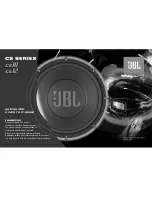
4
PRODUCT DIMENSIONS
RECOMMENDED ENCLOSURE
Frame Diameter
Mounting Depth
Cutout Diameter
A
A
B
B
C
C
A
C
B
The purpose of the information below is to help you select the most appropriate type of enclosure for
your application. We have selected the two most popular enclosure types and their performance benefits.
Sealed Enclosure (Air-Suspension design): Characteristically simpler to make, sealed enclosures usually are better
at controlling the woofer’s excursion and performance at lower frequencies. The added control allows for higher
power handling or use of a bigger amplifier. The secret is to maintain a perfect seal. Using Glues and sealants at
all seams is recommended to prevent leaks and integrity of the enclosure. The size or volume of the enclosure
will directly affect the performance of the woofer. Smaller enclosures generally provide the desired bump to the
frequency response curb and Greater SPL. Larger enclosures will provide a lower but flatter response for deeper
bass. In general, the benefit to the sealed enclosure versus a ported enclosure is a smaller foot print, simpler build
with higher power handling, a more linear flat response, superior sound quality and extended low frequency output.
Ported Enclosure (Bass-Reflex or Vented): A ported enclosure is simply a sealed enclosure with a port or vent
added to the sealed design for the purpose of tuning the enclosure to higher output at the desired tuned frequency,
typically 3db or higher. Another advantage of a ported enclosure is the reduction of cone motion for the speaker,
thus distortion at higher power levels within the tuned frequency response of the port. A drawback is that building
a ported enclosure is more complex than sealed. Having the wrong port or vent could result in poor sound, and
the potential of damaging a woofer when played too loud or out of the tuning frequency. Thus we recommend
not guessing, please follow the guidelines listed in this manual or go to a professional. In General, the benefit of a
ported enclosure versus a sealed is higher volume output at the tuned frequency, stronger bass output with lower
power input.
Construction: We recommend using ¾” MDF (Medium Density Fiberboard) for the construction of an enclosure. It is
critical for the side walls of the enclosure not to flex due to the pressure generated by the woofer, bracing might be
required. The enclosure sides should be secured together with nails/screwed. We also recommend the use of glues
and sealants to maintain the integrity of the enclosure and eliminate leaks.
WDX6.5G2.2 /
WDX6.5G2.4
7.20 in.
(183 mm)
5.18 in.
(131.5 mm)
5.98 in.
(152 mm)
Frame
Diameter
Mounting
Depth
Cutout
Diameter
WDX12G2.2 /
WDX12G2.4
12.95 in.
(329 mm)
7.58 in.
(192.5 mm)
11.34 in.
(288 mm)
WDX15G2.2 /
WDX15G2.4
15.71 in.
(399 mm)
8.48 in.
(215.5 mm)
13.98 in.
(355 mm)
10.98 in.
(279 mm)
7.09 in.
(180 mm)
9.40 in.
(239 mm)
8.78 in.
(223 mm)
6.30 in.
(160 mm)
7.32 in.
(186 mm)
WDX8G2.4
WDX10G2.4
Содержание WDX G2 Series
Страница 7: ...7 4 DVC WIRING CONFIGURATIONS...


























